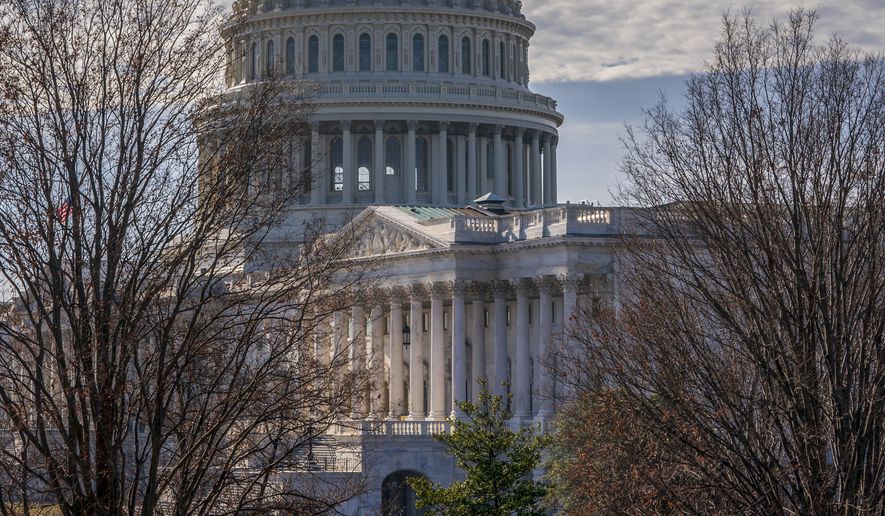The Senate approved 77 Trump nominations in an end-of-Congress deal Wednesday night, filling out the ranks of federal prosecutors, ambassadors, the White House science adviser and the post of anti-drug czar — but no new judges.
The deal came on the final day of the 115th Congress, with Majority Leader Mitch McConnell, standing alone on the chamber floor, reading out the nomination numbers then confirming them by voice vote.
The move caps what’s been an extraordinary two years of both unprecedented action and obstruction, and presages battles still to come over the next two years.
First up will be a decision for Mr. Trump on some 300 or so nominations that still languish, including more than 85 judicial picks that never saw final action. Under normal rules, all of those will expire at the end of the old Congress, marking a victory for liberal activists who’d warned Democratic leaders against any en masse approvals.
Mr. Trump can renominate them in the new Congress, where many will again face Democratic delays.
But the president’s backers are getting restless and one of them says he should be more aggressive and flex his recess appointment powers, installing a bunch of picks in the time between the end of the old Congress on Thursday and the convening of the new one.
“I support the executive authority for this alternative appointment process to keep our government running — that is what it boils down to,” said Victor Williams, an adjunct law professor at the University of Maryland and head of America First Lawyers Association.
There’s historical precedent. President Theodore Roosevelt made a similar move during the end of one session and the beginning of another in 1903.
But other legal analysts say a 2014 Supreme Court decision has changed the rules, with the court saying a recess generally must last at least 10 days for the president’s powers to kick in.
“Unless Congress decides to hold a recess of sufficient length, the president does not have that option,” Jonathan Adler, a law professor at Case Western University, told The Washington Times.
Mr. Trump complained about the slow walking of his nominees in a tweet Tuesday.
“For FAR TOO LONG Senate Democrats have been Obstructing more than 350 Nominations. These great Americans left their jobs to serve our Country, but can’t because Dems are blocking them, some for two years — historic record. Passed committees, but Schumer putting them on hold. Bad!” the president tweeted.
The numbers bear him out, with 55 percent of the 1,158 people he has nominated for civilian positions during his first two years being confirmed.
By contrast, President Barack Obama saw 81 percent of his picks approved in his first Congress and President Bill Clinton scored 87 percent. Even President George W. Bush, who faced a Democrat-controlled Senate, fared better than Mr. Trump, with 72 percent of his nominees approved in his first two years.
Mr. Williams said he would like to see Mr. Trump test his recess powers even with the high court’s decision.
But he also blames Senate Majority Leader Mitch McConnell for failing to create the kinds of long recesses Mr. Trump would need to use his powers.
“He has kept the Senate running these sham pro forma sessions every three days to void the ability of President Trump to make these recess appointments,” Mr. Williams said. “That assures the opportunity does not come up for President Trump.”
Pro forma sessions are held when lawmakers want to go on vacation but cannot muster the votes to officially adjourn.
Mr. Williams said Mr. McConnell should have forced an adjournment vote.
But a McConnell spokesman doubted they would have won. “It’s not something he can just do on his own,” the spokesman said.
Recess appointments last until the end of the second congressional session following the one in which they were made. That means appointments made after the 115th Congress ends should last through the 116th Congress.
Curt Levey, president of the Committee for Justice, said that while that could help with some vacant executive branch positions, it’s not as useful for judges, who serve for life.
“For judges, what you really want is for them to serve for a lifetime. I’m not really sure serving for a year is worth much of an effort,” Mr. Levey said.
Carrie Severino, chief counsel at the conservative Judicial Crisis Network, said Republicans should be able to make headway with their expanded majority in the Senate.
“That is going to start back up again in the new year. It’s not a situation where you have to resort to these extraordinary measures,” she said.
Liberal groups, though, said they hope to thwart a renewed push for judges.
Dan Goldberg, legal director for the liberal Alliance for Justice, praised Senate Minority Leader Charles E. Schumer for refusing any year-end deal on confirmations.
“People with such disturbing records have no place one the federal bench,” he said.
• Alex Swoyer can be reached at aswoyer@washingtontimes.com.




Please read our comment policy before commenting.